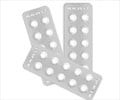Elderly women, especially those above the age of 80yrs, may remain at a higher risk from hypertension and their condition may remain undetected for long as well. The report, which was published in the recent issue of JAMA, said that about 75% of the participants of the survey conducted in the concerned age group have hypertension.
The research, which was based on data from the National Heart, Blood, and Lung Institute’s long-standing Framingham Heart Study, also found that older hypertensive women are especially at risk for having poorly controlled hypertension.Risks for cardiovascular disease also are substantial in this population, indicating the need for greater efforts at safe, effective risk reduction among the oldest hypertensive persons. Among men and women study participants with the highest levels of blood pressure at age 80 or older, 25 percent had a major cardiovascular event (heart attack, stroke or hospitalization for heart failure) within six years’ follow-up.
Despite numerous clinical studies showing the benefits of lowering blood pressure in older hypertensive persons, data suggest that rates of treatment and control are less than optimal and those risks for cardiovascular disease are substantial, reports the researcher Lloyd-Jones.
Lloyd-Jones and co-researchers Jane C. Evans and Daniel Levy, M.D., from the National Heart, Lung, and Blood Institute analyzed data from almost 5,300 Framingham Study participants (2,300 men and approximately 3,000 women).
Among the oldest hypertensive individuals, only 38 percent of men and 23 percent of women had their blood pressure controlled to recommended levels of less than 140 systolic over less than 90 diastolic.
It appeared that poor control was due in part to lack of use of combination drug therapy and, perhaps, to poor selection of drug classes. Despite abundant evidence suggesting that thiazide diuretics are the most cost-effective drugs for blood pressure reduction, and that they are especially effective in the elderly, the researchers found overall low rates of thiazide use, particularly among men.
Advertisement
The researchers observed high prevalence of use of more expensive drugs, such as ACE inhibitors and other drugs, such as alpha-blockers, although data supporting their effectiveness in older hypertensive are limited.
Advertisement
In addition, clinicians may be reluctant to treat older patients as aggressively, because of perceived lower benefits or possible increased risk of side effects.
Source: Newswise
Medindia on Hypertension: Further information
Hypertension: This means high blood pressure. When the systolic blood pressure is over 140 and the diastolic blood pressure is over 90 consistently, then the person is said to suffer from hypertension. Essential hypertension may be caused by genetics, diet, intake of salt, and other environmental factors. A host of other physical; conditions like tumors, kidney disorders, medications etc can also called hypertension, but of a secondary nature.
For further information read:
https://www.medindia.net/patients/
patientinfo/highbloodpressure_about.htm











